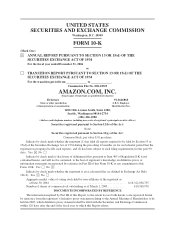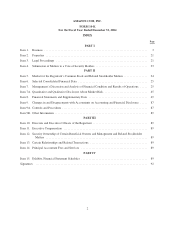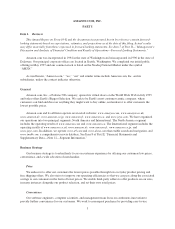Amazon.com 2004 Annual Report Download - page 19
Download and view the complete annual report
Please find page 19 of the 2004 Amazon.com annual report below. You can navigate through the pages in the report by either clicking on the pages listed below, or by using the keyword search tool below to find specific information within the annual report.experience performance problems or other difficulties, it could negatively impact our operating results and
customer experience. In addition, our ability to receive inbound inventory efficiently and ship completed orders
to customers also may be negatively affected by inclement weather, fire, flood, power loss, earthquakes, labor
disputes, acts of war or terrorism, acts of God and similar factors.
Third parties either drop-ship or otherwise fulfill an increasing portion of our customers’ orders, and we are
increasingly reliant on the reliability, quality, and future procurement of their services. Under some of our
commercial agreements, we maintain the inventory of other companies in our fulfillment centers, thereby
increasing the complexity of tracking inventory in and operating our fulfillment centers. Our failure to properly
handle such inventory or the inability or failure of these other companies to accurately forecast product demand
would result in unexpected costs and other harm to our business and reputation.
The Seasonality of Our Business Places Increased Strain on Our Operations
We expect a disproportionate amount of our net sales to be realized during the fourth quarter of our fiscal
year. If we do not stock popular products in sufficient amounts or fail to have sources to timely restock popular
products, such that we fail to meet customer demand, it could significantly affect our revenue and our future
growth. If we overstock products, we may be required to take significant inventory markdowns or write-offs,
which could reduce gross profits. A failure to optimize inventory in our fulfillment network will harm our
shipping margins by requiring us to make long-zone shipments or partial shipments from one or more locations.
Orders from several of our internationally-focused websites are fulfilled primarily from a single fulfillment
center, and we have only a limited ability to reroute orders to third parties for drop-shipping. We may experience
an increase in our net shipping cost due to complimentary upgrades, split-shipments, and additional long-zone
shipments necessary to ensure timely delivery, especially for the holiday season. If the other businesses on whose
behalf we perform inventory fulfillment services deliver product to our fulfillment centers in excess of forecasts,
we may be unable to secure sufficient storage space and may be unable to optimize our fulfillment centers. If too
many customers access our websites within a short period of time due to increased holiday or other demand, we
may experience system interruptions that make our websites unavailable or prevent us from efficiently fulfilling
orders, which may reduce the volume of goods we sell and the attractiveness of our products and services. In
addition, we may be unable to adequately staff our fulfillment centers during these peak periods and third parties
that provide fulfillment services to our customers may be unable to meet the seasonal demand. Finally, we, along
with our customer service co-sourcers, may be unable to adequately staff customer service centers.
We generally have payment terms with our vendors that extend beyond the amount of time necessary to
collect proceeds from our customers. As a result of holiday sales, at December 31 of each year, our cash, cash
equivalents, and marketable securities balances typically reach their highest level (other than as a result of cash
flows provided by or used in investing and financing activities). This operating cycle results in a corresponding
increase in accounts payable. Our accounts payable balance should decline during the first three months
following year-end, which will result in a decline in the amount of cash, cash equivalents, and marketable
securities on hand.
Our Business Could Suffer if We Are Unsuccessful in Making, Integrating, and Maintaining Commercial
Agreements, Strategic Alliances, and Other Business Relationships
We may enter into commercial agreements, strategic alliances, and other business relationships with other
companies. We have entered into agreements to provide e-commerce services to other businesses and we plan to
enter into similar agreements in the future, including as part of our Merchants@, Syndicated Stores, and
Merchant.com initiatives. Under such agreements, we may perform services such as: providing our technology
services such as search, browse, and personalization; permitting other businesses and individuals to offer
products or services through our websites; and powering third-party websites, either with or without providing
accompanying fulfillment services. These arrangements are complex and require substantial personnel and
resource commitments by us, which may constrain the number of such agreements we are able to enter into and
11
























